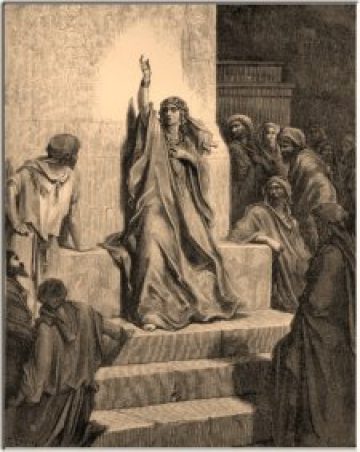
I love my name. It’s no pseudonym. Deborah. Devorah. Queen Bee. Just dare to call me Debbie as a child and my father would swiftly correct the error. The Hebrew Bible was his standard work of choice, and his daughters bear Biblical names. I got particularly lucky with mine.
Poet. Prophetess. Judge. General. I remember telling a middle school classmate that my namesake gave me several career choices: Poet Laureate? General Authority? Supreme Court Justice? Commander in Chief? Plenty to aspire to.
Deborah’s story is found in Judges 4 and 5 and bears retelling. . .
Israel is captive, and the Canaanite king patrols the valleys with 900 iron chariots. Deborah, Israelite judge and prophetess, sits beneath her palm tree in the hills of Ephraim, solving disputes. But one day a voice comes to Deborah, telling her to “Awake, awake and utter a song.” Her people live in fear and avoid the highways, but she can lead them to a vibrant peace. “The inhabitants of the villages ceased, they ceased in Israel, until that I Deborah arose, that I arose a mother in Israel.”
She calls up General Barak, tells him to raise an army. He responds, “If you go with me, I will go; but if you don’t go with me, I will not go.” She agrees, but notes that ultimately victory will be delivered to “the hand of a woman.” When word reaches Sisera that Barak has amassed an army in the hills, he is fearless – he has 900 chariots after all, and he parks them all in the valley, waiting for the Israelites to come down or starve.
Barak may lead the army, but Deborah leads Barak. “Go,” says Deborah. “This is the day God has given Sisera into your hands. Has not God gone ahead of you? “
As the Israelite forces step onto the valley floor, thunder claps, the skies open and rain like spears pour into the river. It seems to Deborah that the stars leave their courses and fight from heaven. The swelling river leaps over its banks and begins to chase Sisera’s army. Soon the horses falter and fall in the torrents, and the chariot wheels spin and sink in the black mud.
Naturally, Sisera abandons his chariot and flees on foot. When he reaches the tent of Jael, she greets him warmly. After giving him milk and tucking him in with a warm blanket, he falls fast asleep. Alone, staring at the oppressive yet defenseless leader, she picks up a tent peg and a hammer and drives it through his temple. When Barak comes in hot pursuit, she calmly greets him as well: “Come, I will show you what you are looking for.”
In celebration, Deborah sings, “I will sing to the Lord, I will sing; I will make music to the Lord, the God of Israel. May we be like the sun when it rises in its strength.”
The land had peace for forty years.
Sometimes we try to draw tidy lessons from Scripture Heroes. Esther teaches us about Courage. Abraham teaches us about Obedience. Job? Strength in adversity. Of course, careful reading of any of these Old Testament stories reveals plenty of delectable messiness. I’m not sure what Deborah “teaches.” I love the poetry, the directive to “awake awake,” and of course I love her leadership. I am struck by the phrase “mother in Israel” – it seems to denote a stewardship absent literal children, and it is a phrase Eliza R. Snow and other 19th century LDS women regularly employed for varying purposes.
What do you make of this tale? What stories do you keep returning to?
P.S. LisaB/Julie — have you come across any good artwork depicting this story?






9 Responses
[…] some good examples of deep scripture study? Check out Deborah’s post on her namesake in the Old Testament Jessawhy’s exegesis on the story of the Good Samaritan TopHat explains her stake […]